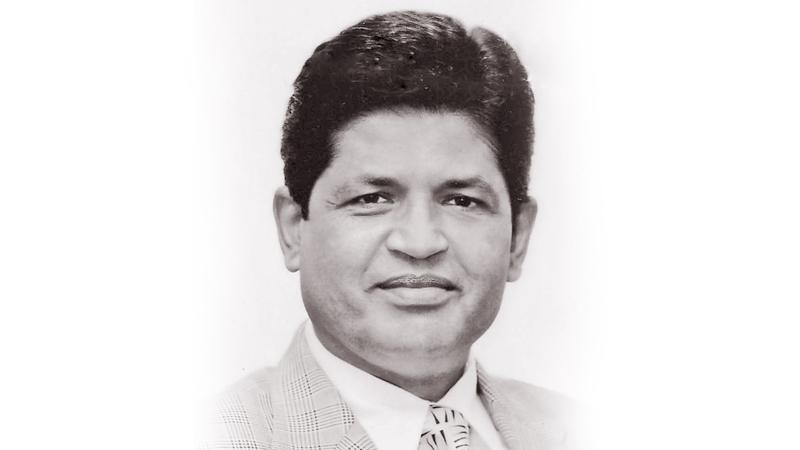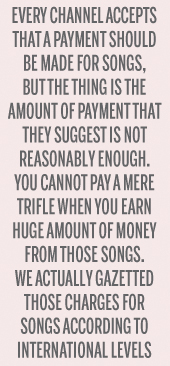
Piracy is a big problem in Sri Lanka. When it comes to the music industry, this is a huge problem because no electronic media, social media and organisers of public concerts pay any royalty to the original artistes. Things have worsened after Sinhala songs started to gain an international demand, especially after the famous song ‘Menike Mage Hithe’ acquired world popularity.
However, there are two organisations in Sri Lanka who work at collecting royalties from the media and other relevant people for artistes.
 They are OSCA (Outstanding Song Creators’ Association) whose Chairman is Jayantha Dharmadasa, the former Chairman of the Sri Lanka Cricket Board and Chairman of the Author, Composer and Publishers’ Organisation of Sri Lanka ( ACPO) W.B. Ganegala, who was also the former Secretary to the Ministry of Mass Media and Information.
They are OSCA (Outstanding Song Creators’ Association) whose Chairman is Jayantha Dharmadasa, the former Chairman of the Sri Lanka Cricket Board and Chairman of the Author, Composer and Publishers’ Organisation of Sri Lanka ( ACPO) W.B. Ganegala, who was also the former Secretary to the Ministry of Mass Media and Information.
However, while OSCA is acting on behalf of singers to collect royalties, ACPO is functioning on behalf of lyricists, musical composers and publishers to collect royalties from relevant institutions. In this backdrop, we spoke to W.B. Ganegala to discuss the piracy issue, particularly the non-payment of royalties for artistes in Sri Lanka. The following are excerpts from the interview:
Q: Could you elaborate on the work that you are doing in ACPO?
A: First, I will give you background knowledge about this. ACPO as a body, functions under the Intellectual Property Act No. 36 of 2003. We are not a Government institution or Non-Governmental Organisation. We are a collective organisation formed with artistes.
There are three people to whom royalties of musical works are divided: lyricist, composer and publisher. The publisher is the one who publishes a song or musical work. Then, how about the singers? They reach royalty as a related price. So we as ACPO, appear for lyricist, composer and publisher while OSCA appears for singer and producer of songs.
ACPO and OSCA are generally called a Collective Management Organisation or CMO. Both are working in relation with the World Intellectual Property Organisation (WIPO) and relevant intellectual property bodies abroad so that we could collect royalties from abroad for our internationally reproduced musical works.
Now I will come to your question. You know, the most difficult thing that we have to do is to collect royalties from our electronic media.
Since last August we took major steps in this matter as we could publish on gazette (February 21, 2021) the amount of payments electronic media should make.
According to that, a radio channel should pay Rs. 20 for a song that they broadcast while a television channel should pay Rs. 100 for a song that they telecast.
Then the money is divided among lyricist, composer and singer, each with Rs. 6 (from Rs. 20) and Rs. 30 (from Rs. 100) - the balance is used by the organisation that collects them from media channels.
Q: We often see that reality shows in many channels are using songs by other artistes. Do you charge a fee from them as well?
A: Of course. A gazette published on July 17, 2019 clearly mentions that relevant channels should pay for using the songs by other artistes. But unfortunately, still we are unsuccessful in taking a discussion on this matter as they are avoiding it. However, recently a committee was appointed by the Minister of Commerce Bandula Gunawardane, in this regard. But we hope the problem will be solved successfully in the near future.

Every channel accepts that a payment should be made for songs, but the thing is the amount of payment that they suggest is not reasonably enough. You cannot pay a mere trifle when you earn huge amount of money from those songs. We actually gazetted those charges for songs according to international levels.
Q: How about the Youtube songs?
A: If you are a book publisher, you have to pay royalties for the author to publish his book. Like that, if a youtuber wishes to telecast a song, he or she has to take a copyright license from the copyright holders who are song producers or lyricists or others. For that, they have to pay royalties. And the relevant copy right holders also have to look into the other matters as every single play has a copyright element - that element has to be collected by copyright holders. Though we do not get involved in this process, we, at CMO, can collect them for composers and lyricists separately if they are a member of our group and make a request.
Q: We also hear about other royalty collecting companies. For instance, there are two private companies operated by Harsha Bulathsinhala and Kalani Weerasinghe (son of Rohana Weerasinghe). Are they legal companies? Do you advocate those privately run companies who look for profits?
A: Harsha Bulathsinhala was, in fact, the managing director of ACPO, but after the general assembly held last year, a new administration was appointed. Accordingly, I was elected as the president, and six others were selected for the director board: Dr. Somarathna Dissanayake, Nilar N. Kasim, Ranga Dasanayake, Raj Kumar Pillayamkulam, Sarath De Alvis and Navarathna Gamage.
The two companies that you said are ‘We Did It’ operated by Harsha Bulathsinhala, and ‘CEY Music’ operated by Kalani Weerasinghe. The difference between our ACPO and them is that we have no any aim of making profits. We are a voluntary organisation established on behalf of lyricists, composers and publishers. In fact, they are subsidiary companies of us who are doing the publishing part of ACPO. They can do that since we have a part of publishers in ACPO.
They are actually members of our main company ACPO, and the people who worked at them are members of CMO (Collective Management Organisation) as well. You know, some people try to make a conflict between us, but we do not have such a problem, we work with harmony.
Q: Yet, don’t you think artistes are being exploited by them since they can increase the commission they earn at any time?
A: They cannot increase the commission without the consent of those artistes. As they are members of those companies they should come to an agreement with them. So I don’t think such problem would emerge. And those companies are also registered under the Intellectual Property Act No. 36 of 2003.
Q: Why can’t you do their job?
A: There are two people in this: publishers and publishing administrators. The two companies you mentioned are publishing administrators. Warner, Sony, Universal group are publishers, and publishing administrators managing right holders’ rights on behalf of creators.
CMO are mainly for collecting the public performance rights from radios, televisions and live performances. But reproductions, cover versions and other mechanisms are managed by those companies. However, if somebody wants us to manage their mechanisms for them, we will oblige.
Q: You know after the Sinhala cover version ‘Menike Mage Hithe’, there emerged a great demand for Sinhala songs at international level. How do you get involved in this matter?
A: If somebody has the publishing rights, they can directly deal with the international market. For instance, the publishing right of ‘Menike Mage Hithe’ belongs to musician Chamath Sangeeth, and its lyricist, Dulan ARX. So they can directly deal with international counterparts regarding its reproductions.
While holding Sinhala rights in that song, now they have sold the other language rights to T Series. But if somebody is a member of CMO and requests us to involved in them, we can do that. For the moment the artistes of ‘Menike’ song have not taken our membership or asked us to get involved in their song to collect royalties.
